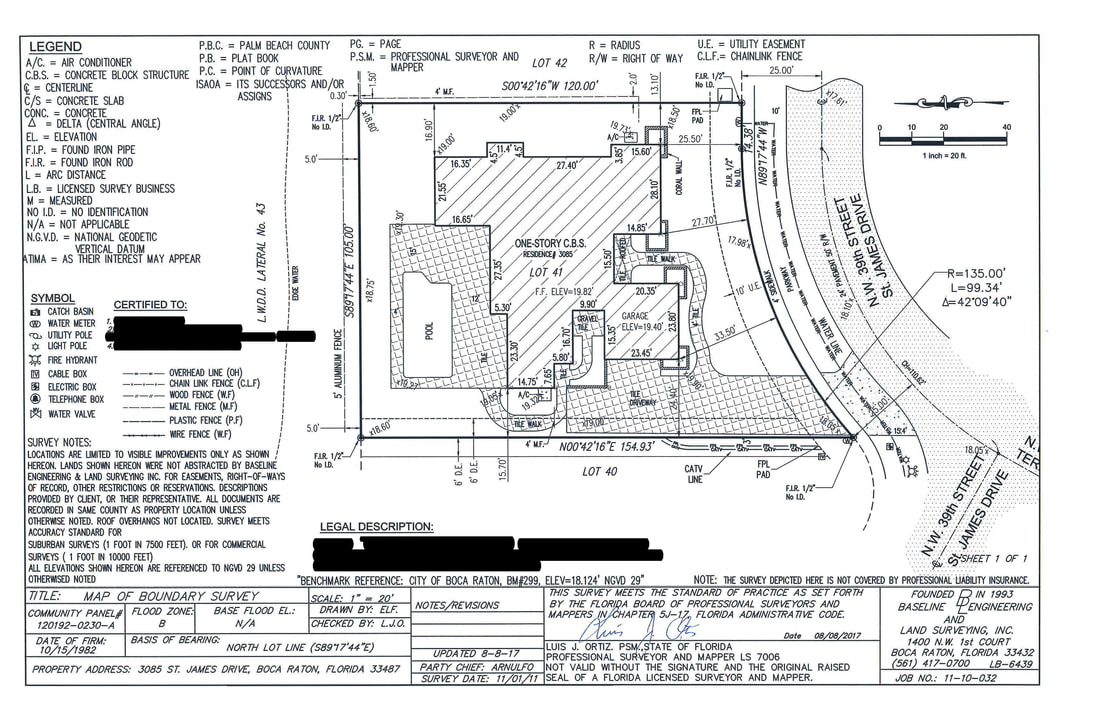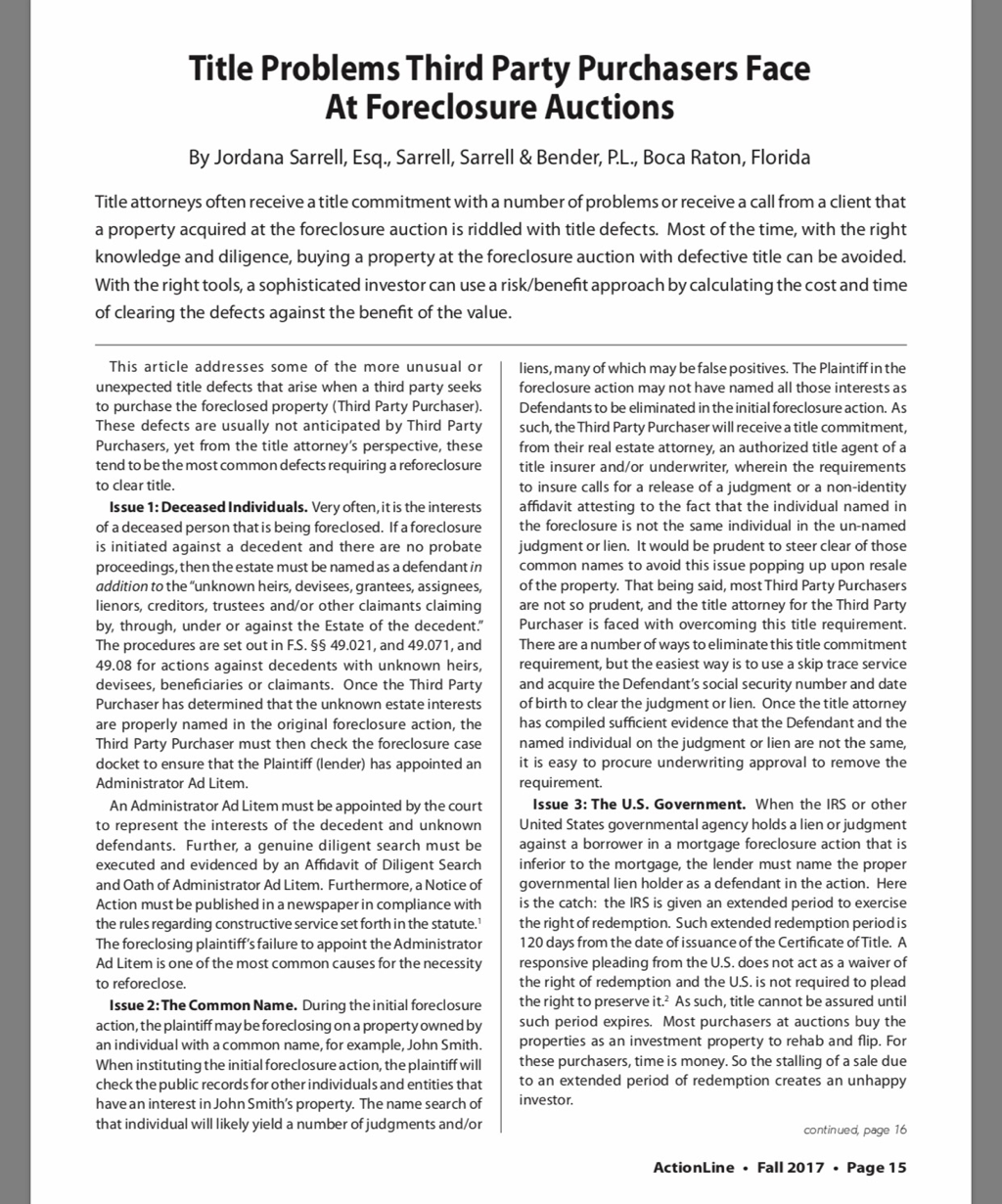|
The Fund announced that JORDANA SARRELL, P.A., has been named a Member of The Fund’s President’s Circle for 2017. The Fund's President's Circle is an elite group of the top 100 Member firms based on the policies remitted in 2017.
4 Comments
The property appraiser is currently accepting new applications for the homestead exemption for 2018 and the deadline to file is March 1, 2018. In order to qualify for the homestead exemption you must be living in the property as your primary residence as of January 1 of 2018. Do not forget to gather all the appropriate documents and information you need to file whether you do it in person at the tax collector's office or online - for Palm Beach County you can click this link:
https://secure.co.palm-beach.fl.us/papaefile/web/heapplication/login.aspx For instructions on how and where to file, contact the staff at Sarrell, Sarrell & Bender, PL, by telephone at 561-807-7107 or email [email protected] Don't forget that if you sold your old homestead and purchased a new one you may be eligible for Portability! Portability allows Florida residents with a previous Homestead Exemption to transfer part of their tax savings to their new residential property in Florida so long as the sale and purchase fall within a two year window. The new tax bill affects homeowners in several ways. Here are some of the highlights of how the tax bill can affect a homeowners. Feel free to contact the attorneys at SSB Law to answer any more questions you may have.
* Eliminates home equity deduction; interest home equity lines of credit will no longer be deductible whereas interest was deductible on equity lines up to $100,000. * Reduces mortgage interest deduction limit to $750,000. While the deduction limit pertaining to mortgage interest drops to $750,000 of debt on your primary residence, it remains $1 million for homes purchased before Dec. 15 of this 2017. * Retains current law treatment of capital gains from home sales. * Doubles the standard deduction. The new law increases the standard deduction to $12,000 for single The new law increases the standard deduction to $12,000 for single filers and $24,000 for joint filers. filers and $24,000 for joint filers. * Limits deduction for state and local income tax, real property tax, and sales tax (in the aggregate) to a maximum amount of $10,000. This only affects Floridians for our property taxes since we do not have state income tax. * Does not reinstate the deduction for mortgage insurance premiums WARNING! WIRE FRAUD ON THE RISE! ALWAYS VERBALLY CONFIRM WIRE INSTRUCTIONS RECEIVED VIA EMAIL!12/12/2017 At SSB law we have implemented strong and vigilant internal protection techniques to prevent hacking and wire fraud. We verbally confirm all wire instructions received via fax or email. And to err on the side of caution, our IT department has taken steps to ensure our outgoing email is secure and protected against being hacked.
First let us start with the basics - what is a boundary survey? A boundary survey is, in the most basic of terms, a drawing, map of the property showing precisely where the house lies within the boundary lines, the patio and/or additions as well as the locations easements and/or encroachments, if any. The survey will confirm the legal description of the property, disclose any encroachments, easements or rights of way (drainage easements, sewer easements, etc) and pinpoint locations of fences, driveways, and other relevant information pertaining to the property being purchased. A common type of encroachment is a utility easement running through a driveway or rear of the property given to the local utility agency for maintenance of water lines, sewer lines, cable, etc. The survey also confirms legal access (ingress/egress) to the property. Lenders, in literal terms, do not require a survey. Yes, that is true. Lenders do however, require that the title agent issuing the lender's title policy delete the survey exception which is a standard exception on all title policies and provide a Florida Form 9 / ALTA 9 endorsement to the lender's title policy issued at the closing of the loan. Lenders are in need of more comprehensive title insurance coverage and require affirmative coverage over any matters shown on the survey that could interfere with their secured interest (the property). Such matters are protected by the issuance of the ALTA 9 endorsement. Examples of which include coverage for loss due to incorrectness of assurance that certain matters do not exist (violations of zoning laws), violations of platted setback lines, encroachments, encroachments of improvements onto easements, etc. In simple terms, should an encroachment or setback pose issue and compromise the integrity of the lender's interest in the secured property, the endorsement will allow for the lender to make a title insurance claim to protect their interest. Without the endorsement, the lender is subject to loss of part or some of their secured collateral (the property) due to an encroachment or setback violation, etc. Even in cash transactions, a survey should always be purchased by the buyer because it provides assurances to the buyer for a variety of matters. It allows the buyer to determine if there are any title matters disclosed on a survey that render the title unmarketable, confirms that boundary lines and legal descriptions, and provides notice of any encroachments onto the property by way of easements or other rights of way that will interfere with your property lines. For example an easement in the rear of your property for a utility company that is 5 feet into your property line will prevent you from putting up a fence at the edge of your property line and require the fence be 6 feet from the property line. It helps you discover that the fence line is not the true property line. Below is an example of a survey which shows a 6 foot easement along the western boundary line; 10 foot utility easement running through the driveway and the fence not actually within the boundary lines of the property (in the rear).
Categories All TITLE PROBLEMS THIRD PARTY PURCHASERS FACE AT FORECLOSURE AUCTIONS
AS WRITTEN BY JORDANA SARRELL, ESQ., IN THE FALL OF 2017 ISSUE OF ACTIONLINE, THE FLORIDA BAR'S REAL PROPERTY AND PROBATE SECTION'S QUARTERLY PUBLICATION HURRICANE IRMA: DAMAGE & PENDING CONTRACTS:
Many properties under contract during Hurricane Irma are now faced with the question of repairs and lender requirements to move forward to the closing date. Lenders are requiring re-inspections and appraisals of properties under contract prior to closing the loan. What happens if the storm caused damage to the property? Standard M in the FAR/BAR contracts address this issue by providing two options: 1. 1.5% COST CAP: The cost of restoration should be obtained by a licensed professional. If the restoration cost is 1.5% (or less) of the purchase price, the parties proceed to closing with the cost of restoration being the obligation of the seller. BUT what if restoration cannot be completed prior to closing? Then the contract directs 125% of the restoration cost be escrowed at closing and used to complete the restoration. 2. IN EXCESS OF 1.5% COST CAP: If the cost to repair exceeds 1.5% the buyer has the option of (1) taking the property AS IS and receiving 1.5% credit on the purchase price OR (2) canceling the contract and receiving a refund of their deposit. Sellers and Buyers should take note that the replacement of trees is specifically excluded (but cost of pruning and removal is included). Why do I need title insurance?
I cannot even tell you how many times that I have been asked that question. The truth is most people don't know what title insurance is and I do not blame them, I did not know what it was when I bought my first home! So we have summed up exactly what is title insurance and why you need it in a few succinct points: Title insurance is NOT casualty insurance. Title insurance protects the new owner (and lender, if any) from any liens, encumbrances, or claims against the property that originated prior to their ownership. For example: A buys a home from B and B had a home equity line of credit. B was a bad boy. B withdrew the entire line of credit the day of closing! Now A has a valid and enforceable mortgage against A's new home. But A was smart and purchased an owner's title insurance policy which now protects A's interest in the home and is liable for the balance of the equity line of credit. Another example: A sells his primary residence aka homestead to B. A is married but A's spouse did not sign the deed. Florida law requires spousal joinder on conveyance of homestead property. So now B's title (deed) is defective. B must now place a claim with his title insurance policy to secure a corrective deed so that B can sell or mortgage/encumber the property as B wishes. Title insurance protects your equity in your home up to the full amount of the price for which the home was purchased. Title insurance is absolutely necessary. Spend a few dollars now to save a lot of dollars later. Plan on Buying Properties at the Foreclosure Auction? A Checklist is a Great Place to Start.Although the checklist below is by no means comprehensive, it is a good start. Buying at the foreclosure auction is a risky business! With the right knowledge and diligence, buying a property at the foreclosure auction riddled with title defects can be avoided. Schedule an appointment with our title defect specialist, Jordana Sarrell, Esq., LL.M., to discuss the benefits and downfalls of foreclosure properties and how to protect your interest and money!
Want to know what you do if a problem arises when going through these checklist items? It is essential to conduct a full and thorough search behind and through the foreclosure to safeguard against buying problematic or defective title at the foreclosure auction. A real estate attorney should be consulted for guidance and advice. The checklist above is NOT a comprehensive checklist and is not intended to serve as a guide to buying property at the foreclosure sales. The checklist is for informational purposes only. For a more thorough and detailed analysis and checklist, contact SSB LAW today! Inactive. Expired. Open. These three verbs when associated with municipal or county permits in a residential real estate transaction can send a buyer, seller, real estate agent or title company into a frenzy. But what is really the responsibility of parties in an AS IS residential real estate transaction with respect to permits?
Most people operate under the presumption that permits are a title issue or in other words covered under a title policy. This is simply untrue. Rather the opposite is true, inactive/open/expired permits are specifically excluded from title insurance policy jackets. So, any inactive/expired/open permits are not covered under your title policy should an issue arise and the title agent is not under any obligation to ensure that they are dealt with. The standard FARBAR AS IS contract specifically places the onus on the buyer to make an inquiry as to whether there are any inactive/open/expired municipal or county permitsduring the inspection period. What does this mean? It means that if the buyer doesn't conduct a permit inquiry during the inspection period, any inactive/open/expired permits are not required to be closed to finalized the sale. Moreover, if the buyer discovers inactive/open/expired permits, within the inspection period, the seller is only required to facilitate the closing of those permits and not required to spend any money in the process. Permits, when not dealt with, however, in some situations amount to a greater problem such as a municipal or county code violation leading to monetary fines. So a prudent real estate attorney representing a buyer will ensure that the contract specifically includes language requiring any inactive/open/expired permits be closed at the seller's sole expense. Or a seller's attorney will leave the contract in its current form as it benefits the seller. It is always important to have a real estate attorney with you every step of the way from negotiating a contract through closing to ensure you are completely protected. After all buying real estate will likely be the biggest and most important purchase of your life! |





 RSS Feed
RSS Feed